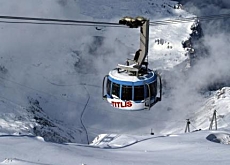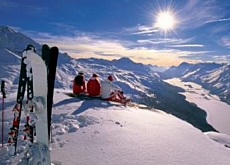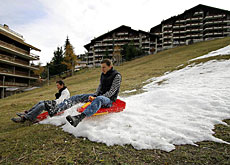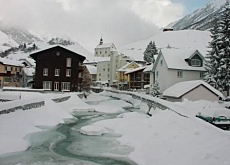Taking the temperature of ski resorts

The Swiss tourist industry has been undergoing radical changes to face the challenges posed by global warming – and greater competition.
Particularly affected are the country’s 650 cable car and ski lift operators, which are the main economic force in many mountain regions.
The popularity of holidaying in the Swiss Alps in winter reached its peak in the 1980s.
The decline in the 1990s was attributed to cut-throat airline competition which made sunny, southern destinations more affordable, a failure to upgrade facilities and adapt modern marketing methods as well as uncertain snow conditions blamed on global warming.
Tourist arrivals are on the rise again but international competition remains fierce and the media like to proclaim the death of skiing each time a new study on rising temperatures is published, doing untold damage to the industry’s image.
Even though Swiss alpine resorts fare quite well in most climate change scenarios since most are located at altitudes high enough to keep them in snow-reliable zones, the operators know this alone is not enough to ensure survival.
“We would like to enlarge our ski area, which shows that we strongly believe we will be able to ski here in 20 years,” Albert Wyler, managing director of Titlis Rotair, the mountain transport company in Engelberg, told swissinfo.
The plan is to build high-altitude ski lifts to connect the Titlis area with two other resorts in order to create one large ski area with 210km of runs – three times the number in Engelberg.
Not big enough
“All three resorts have the same problem – they are medium sized,” Wyler explained. “We will become internationally competitive if we merge our ski areas.”
Titlis is also leading the Swiss arms race by equipping itself with enough cannon to blanket half of its slopes with manmade snow in order to ensure a good base for skiing without having to rely on Mother Nature.
The ski area in central Switzerland is doing everything right, according to tourism expert Thomas Bieger of St Gallen University.
“At the end of the day there will be about 20 internationally competitive Swiss resorts that will also be able to afford to invest in snowmaking, for example, necessary to combat possible climate change,” Bieger told swissinfo.
Virgin terrain
He also supports the trend to exploit virgin, snow-reliable terrain at higher altitudes while calling on resorts to compensate for this by dismantling lifts in lower areas.
But he says studies show that high-altitude lifts generate less turnover even though they are more costly to build and maintain. And they will be more susceptible to damage from storms which are expected to become more frequent due to global warming.
Swiss geographer, Monika Jäggi, is opposed to the uphill race.
Having mapped the damage skiing does to mountainsides in canton Valais, she says the slopes become barren of vegetation making them prone to erosion – the last thing needed since climate scientists are already predicting that thawing permafrost will lead to an increase in landslides.
Environmental sovereignty
But she is more concerned about the effects trade liberalisation will have on Switzerland’s environmental sovereignty.
In a research paper on world trade commissioned by the Swiss non-governmental organisation, Berne Declaration, Jäggi argues that the General Agreement on Trade in Services (Gats) – which Switzerland has joined – weakens efforts to preserve unspoilt mountain regions.
“The aim of Gats is to reduce trade barriers and environmental laws are seen as barriers to trade,” she told swissinfo.
She says Switzerland failed to put any restrictions on market access for foreigners, which means large, international investors will in future be able to develop mega mountain resorts in the country without any regard for the environment.
The government set a dangerous precedent in 2006, according to Jäggi, when it made an exemption to the law regulating foreign ownership of property to enable Egyptian investor, Samih Sawiris, to continue with plans to build a huge resort in Andermatt.
The arbiter in any future disputes will be the World Trade Organization, not the Swiss government, she says.
swissinfo, Dale Bechtel
There are 650 mountain transport and ski lift companies in Switzerland.
With 11,000 employees, they are a key economic factor in mountain regions.
The companies have a combined annual turnover of approximately SFr840 million ($687 million), of which around 25% is reinvested in maintaining or purchasing new infrastructure.

In compliance with the JTI standards
More: SWI swissinfo.ch certified by the Journalism Trust Initiative














You can find an overview of ongoing debates with our journalists here . Please join us!
If you want to start a conversation about a topic raised in this article or want to report factual errors, email us at english@swissinfo.ch.